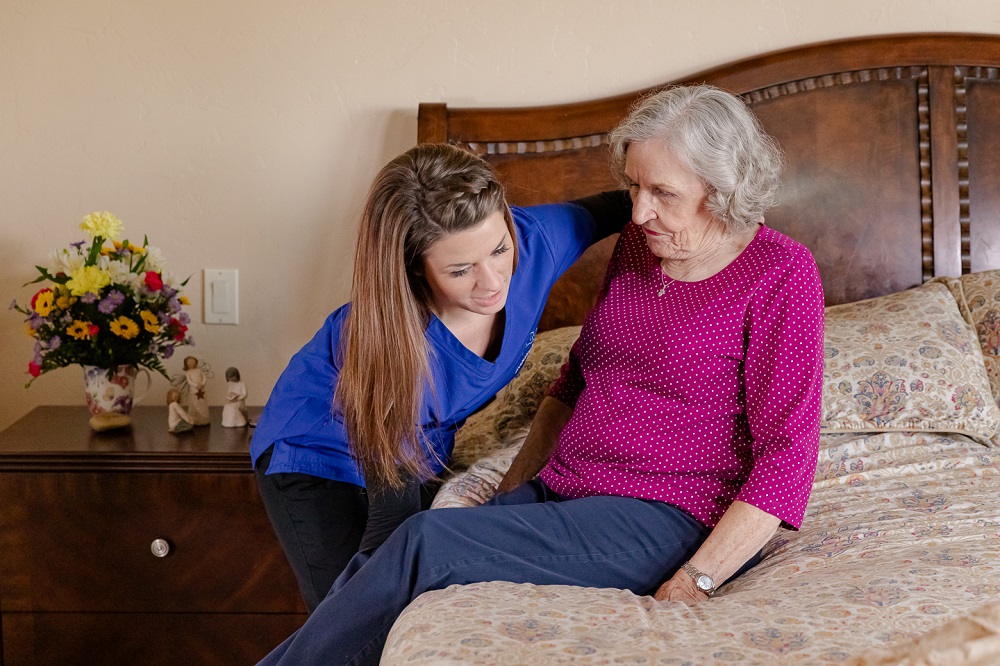
Sleep is a necessary part of life. Without adequate rest, the mind and body are unable to fully recharge. Some seniors may find themselves unable to enjoy a quality night’s sleep. Here are eight tested tips to ensure an elderly loved one receives a good night’s rest.
Healthy sleep is critical to brain function. When the brain does not have the chance to recharge during sleep, the individual experiences a range of consequences. A lack of sleep impacts concentration, the ability to think clearly, memory processing, and the ability to function overall.
Individuals who are deprived of sleep are at higher risk for various diseases and medical conditions. Sleep deprived people, for instance, can develop high blood pressure, heart disease, stroke, obesity, and type 2 diabetes. Adults without adequate sleep are at risk for an early death.
The Sleep Foundation recommends that adults age 65 and older receive seven to eight hours of sleep each night. These crucial hours of rest contribute to proper cognitive and behavioral functions. During quality sleep, the body also repairs cell damage and rejuvenates the immune system.
Older adults are more prone to developing problems with sleep. Normal bodily changes affect sleep patterns. Individuals over the age of 60 do not sleep as deeply as younger people. Plus, aging people may sleep earlier; or, seniors may awaken earlier.
Sleep problems can develop later in life. Growing older often comes with the development of age-related medical conditions, many of which impact sleep. In one study, insomnia was reported in nearly a quarter of older participants. In fact, the condition is rather common among seniors.
Underlying medical conditions are also contributors to sleep problems in seniors. Sleep apnea and other types of breathing disorders related to sleep can occur in the elderly population. Restless leg syndrome (RLS) and periodic limb movement of sleep (PLMS) interrupt nighttime rest.
Older adults do not need to suffer from chronic sleep deprivation. Seniors will benefit from a quality night’s sleep with the help of knowledgeable caregivers. Integrating good habits, like the eight that follow, into a daily routine can promote healthy sleep at bedtime.
Tip 1: Schedule Daily Sleep
Caregivers are urged to establish a sleep schedule for elderly care recipients to follow. Set a consistent time each night to prepare for bed. Even on weekends, the senior should go to bed and awaken in the morning at the same times. The aging body becomes accustomed to the schedule.
Tip 2: Develop a Bedtime Routine
Elderly individuals, especially those with dementia, thrive in routine. Sleep, too, should be included in a daily routine. Create a daily routine to prepare for bed. Caregivers may give the senior a book, dim the lighting, or play soothing music.
Tip 3: Avoid Daytime Naps and Evening TV
Daytime and evening napping can rob a senior of a good night’s rest. Caregivers should also keep the senior from watching overly stimulating television shows before bed. Horror flicks, for instance, are unsettling and can keep an older adult awake into the night.
Tip 4: Ban Electronic Devices in the Bedroom
Older adults may reach for a smartphone or tablet prior to bedtime. Caregivers should consider implementing a ban on electronic devices in the bedroom. The light from computer, tablet or smartphone screens can make it difficult for individuals to fall asleep.
Tip 5: Avoid Alcohol and Caffeine Late in the Day
In order to prevent suddenly waking in the middle of the night, seniors are advised to not drink alcohol late in the day. Even small amounts of alcohol make it difficult to stay asleep. Similarly, avoid beverages loaded with caffeine, such as teas, coffees and sodas.
Tip 6: Drink Fluids and Eat Meals Early
To prevent bathrooms trips in the middle of the night, seniors are encouraged to avoid drinking liquids before bed. Likewise, caregivers should schedule meals early in the day. A full meal eaten close to bedtime can make falling asleep a challenging ordeal.
Tip 7: Exercise During Daytime Hours
Caregivers who schedule physical exercise early in the day will see better nighttime sleep results in their elderly care recipients. Exercise should ideally be scheduled at the same times each day. Seniors should be careful to avoid exercising within three hours of bedtime.
Tip 8: Create a Sleep Zone
The senior’s bed should be reserved as a place to sleep. The bed should be comfortable, with cozy linens, pillows and a mattress. Adjust the temperature in the bedroom to suit the senior’s comfort level. The bedroom lights should also be lowered to encourage sleep.
Sleeping well at night is possible when caregivers incorporate healthy lifestyle changes and sleep habits into the senior’s daily routine. If the care recipient still cannot sleep, a visit to the doctor can help determine if sleep is being interrupted by a medical condition or medications.

When your elderly loved one has issues with sleep, turn to a home care agency, like Assisting Hands Home Care. Our experienced caregiving professionals are trained to help identify and correct problems that can lead to sleep deprivation at night.
Assisting Hands Home Care offers reliable overnight care. This service is designed to ensure older care recipients are monitored throughout the night. Caregivers help the senior prepare for bed and are available to meet nonmedical care needs throughout the night.
As a reputable home care agency, we also provide assistance with all the activities of daily living. Our professionals prepare healthy meals for seniors to consume well before bedtime, provide transportation to doctors’ offices to assess sleep issues, and provide hygiene assistance in preparation for bed.
Families with seniors who live in Matteson, Frankfort, Mokena, Crete, Bourbonnais, Illinois, and surrounding areas, are encouraged to consult Assisting Hands Home Care for quality elder care. Whether your aging loved one needs help during the day or night, our home care agency provides flexible scheduling and services. Call us at (708) 880-7711 to start reliable senior care.
















